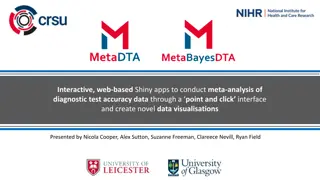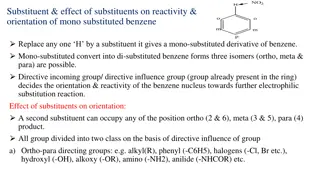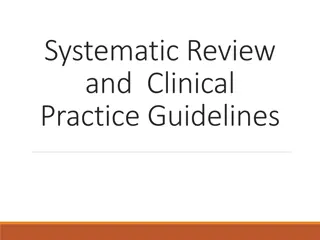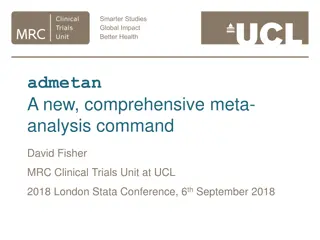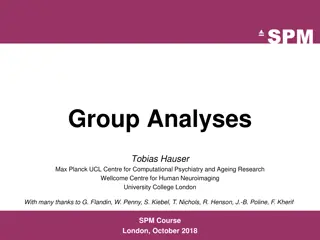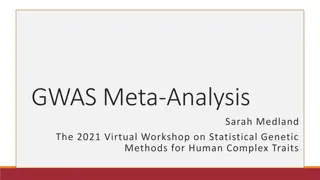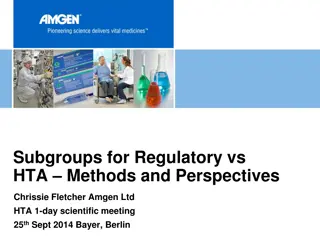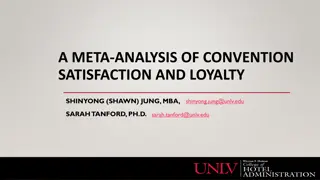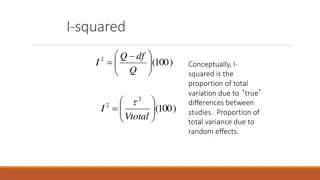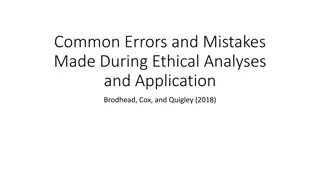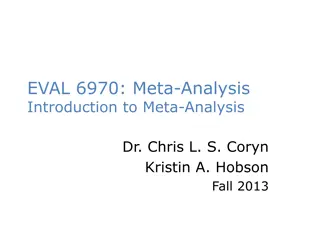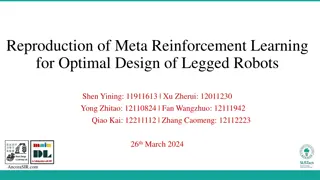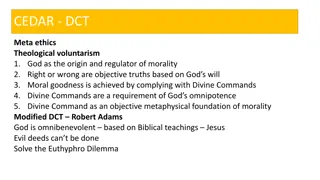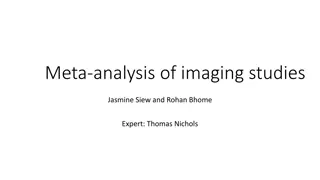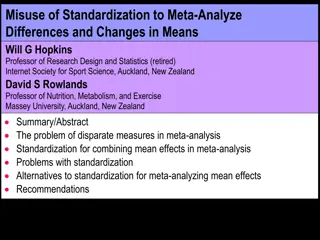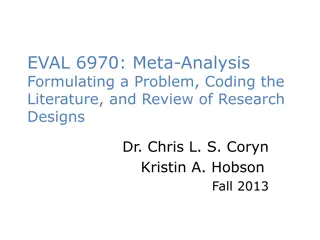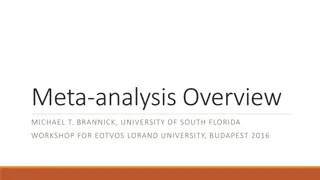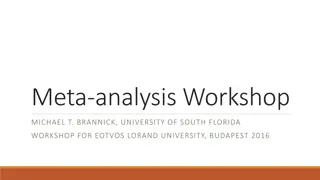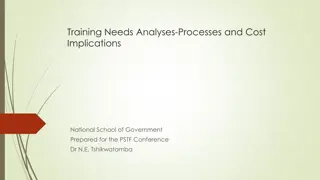Introduction to Meta-analysis in Stata
This workshop, presented by Dr. Christine R. Wells from UCLA, provides an in-depth exploration of meta-analysis in Stata. Participants will learn about systematic reviews, data collection and organization, running meta-analyses, interpreting results, creating graphs, and identifying biases. The focu
5 views • 181 slides
Interactive Web-Based Shiny Apps for Meta-Analysis of Diagnostic Test Accuracy
Explore interactive Shiny apps presented by Nicola Cooper and team for conducting meta-analysis of diagnostic test accuracy data with a point-and-click interface. Find educational primers, principles, and tools to enhance evidence synthesis methods and visualization in healthcare.
2 views • 22 slides
Substituent Effects on Benzene Reactivity and Orientation
Substituents in benzene derivatives influence reactivity and orientation in electrophilic substitution reactions. They can be classified as ortho-para directing or meta directing based on their effect. Ortho-para directing groups increase electron density and activate the ring, while meta directing
8 views • 14 slides
Introduction to Three-Level Meta-Analysis Models in R: A Practical Example
Explore three-level meta-analysis models in R with a focus on the association between paternal anxiety and child emotional problems. Learn to prepare data files, fit models using the rma.mv function in metafor, and understand the structure of the formula for random effects. Follow along with a step-
10 views • 22 slides
Systematic Reviews, Meta-analysis, and Clinical Practice Guidelines
Explore the importance of systematic reviews, critical appraisal questions, meta-analysis, and clinical practice guidelines in the healthcare field. Learn about the process of appraising systematic reviews, the significance of meta-analysis, and the benefits of following clinical practice guidelines
2 views • 16 slides
Comprehensive Overview of Admetan: A New Meta-Analysis Command
This meta-analysis command, Admetan, introduced by David Fisher from MRC Clinical Trials Unit at UCL, offers a comprehensive analysis of combining results from independent studies. It builds on the history of meta-analysis in Stata and aims to enhance capabilities for researchers. Admetan provides f
1 views • 19 slides
Neuroimaging Group Analyses: Methods and Results Overview
In this collection of images and descriptions, various aspects of group analyses in neuroimaging research are explored, including statistical parametric mapping, first-level analyses, and assessing different subjects using fixed effects, random effects, and mixed effects analysis. The content delves
4 views • 38 slides
Meta-Analysis in GWAS: Methods and Applications
Meta-analysis in GWAS involves combining data across studies to estimate overall effects, explore cohort differences, improve power, and replicate findings. It includes joint vs. meta-analysis, methods, and types such as fixed effect and random effect meta-analyses.
0 views • 20 slides
Challenges and Perspectives in Subgroup Analyses for Regulatory and HTA Methods
This presentation discusses the importance of subgroup analyses in pharmaceutical development, focusing on perspectives from regulatory agencies, HTA bodies, and the pharmaceutical industry. It highlights the challenges, methods, and recommendations for optimizing subgroup analyses to enhance drug d
1 views • 26 slides
Meta-Evaluation of Private Sector Interventions in Agribusiness: Impacts and Methodologies
This meta-evaluation study explores the impact of access to finance and farmer/business training interventions on agribusiness indicators. It discusses the methodologies used in evaluations, highlighting the use of randomized control trials and quasi-experimental methods. Findings provide insights i
0 views • 25 slides
Meta's Role in Amplifying Anti-Rohingya Hate on Facebook
The investigation findings reveal Meta's failure to address hate speech and incitement against the Rohingya people on Facebook, resulting in a platform that amplified and promoted harmful content. Despite admitting in 2018 that more needed to be done, Meta's business model of data collection and eng
4 views • 7 slides
Meta-programming in Haskell: A Closer Look at Splices and Quotations
Explore the world of meta-programming in Haskell through splices and quotations. Learn about successful extensions introduced by Simon Peyton Jones and Tim Sheard, including practical examples like generating source code using splices that are type-checked and compiled at compile time. Dive into con
3 views • 45 slides
Evidence for Hydrometeor Storage and Advection Effects in DYNAMO Budget Analyses of the MJO
Variational constraint analyses (VCA) were conducted for DYNAMO in two regions to compare observed radar rainfall data with conventional budget method results, examining differences and composite analyses of MJO events. The study utilized input data including Gridded Product Level 4 sounding data an
0 views • 13 slides
Meta-Analysis of Convention Satisfaction and Loyalty Trends
This meta-analysis explores the relationship between attributes, perceptions, satisfaction, and loyalty in the convention industry. It highlights key findings from multiple studies using statistical methods to analyze attendee satisfaction and loyalty factors. The study emphasizes the importance of
0 views • 11 slides
Prediction and Confidence Intervals in Meta-Analysis
Conceptually, I-squared represents the proportion of total variation due to true differences between studies, while Proportion of total variance is due to random effects. Prediction intervals provide a range where study outcomes are expected, unlike confidence intervals which contain the parameter's
2 views • 26 slides
Future Role of State Governance through Meta-Governance and Political Leadership
Governance research perspective discusses the evolving role of the state in mobilizing public and private actors through interactive forms of governance. Meta-governance theory emphasizes the governance of governance, with a focus on interactive governance arenas. Recent theories of political leader
2 views • 11 slides
Interactive Microbiome Data Analysis with Parallel-Meta Suite
Conduct interactive and rapid microbiome data analysis on various platforms using Parallel-Meta Suite. This software, developed by a team from Qingdao University, simplifies the process from installation to verification. Utilize the step-by-step guide to download, install, and verify the software to
1 views • 13 slides
Contexts: A Meta-Ontological Approach
Ontologies provide a general representation of reality, but knowledge is mostly context-dependent. Analyzing different types of contexts, from linguistic to manufacturing, remains a challenge. This study aims to deepen the understanding of the ontological nature of contexts by leveraging a meta-onto
0 views • 14 slides
Developing Essential Meta-Skills for Personal Growth
Enhancing meta-skills such as focusing, initiative, integrity, adapting, collaborating, leading, communicating, and feeling is crucial for personal development. These skills enable individuals to maintain concentration, make confident decisions, uphold ethical values, embrace change, build relations
0 views • 14 slides
Bayesian Meta-Prior Learning Using Empirical Bayes: A Framework for Sequential Decision Making Under Uncertainty
Explore the innovative framework proposed by Sareh Nabi at the University of Washington for Bayesian meta-prior learning using empirical Bayes. The framework aims to optimize ad layout and classification problems efficiently by decoupling learning rates of model parameters. Learn about the Multi-Arm
1 views • 27 slides
Common Mistakes in Ethical Analyses: A Guide
The article discusses common errors in ethical analyses and applications, including wrongful appeals to authority, incomplete analyses, and the importance of consulting with professionals. It highlights instances where decisions may be based solely on others' opinions without thorough assessment, em
1 views • 18 slides
EVAL 6970: Meta-Analysis
Dive into the Fall 2013 introduction to meta-analysis course led by Dr. Chris L. S. Coryn and Kristin A. Hobson. Explore topics such as course agenda, required textbooks, software requirements, homework assignments, final project details, weighting of components, instructional format, and course web
1 views • 30 slides
Reproduction of Meta Reinforcement Learning for Optimal Design of Legged Robots
Our project aims to reproduce the Meta Reinforcement Learning process for optimal design of legged robots, focusing on understanding robot design parameters, algorithms, and optimization. We will explore Markov Decision Process (MDP), Model-Agnostic Meta-Learning (MAML), and design optimization tech
1 views • 9 slides
EVAL 6970: Meta-Analysis
Delve into the concepts of effect sizes and precision in meta-analysis, covering various statistical notations, raw mean differences, independent and dependent group analyses. Understand the nuances between including different outcome measures, utilizing raw mean difference for meaningful outcomes,
0 views • 27 slides
Meta-Ethics: God's Role in Moral Truths and Ethical Foundations
Meta-ethics delves into the nature of ethical statements, exploring the concept of morality originating from God, objective truths based on Divine Commands, and the dichotomy of cognitive and non-cognitive ethical perspectives. It discusses theological voluntarism, the Euthyphro Dilemma, and various
0 views • 27 slides
Meta-Regression and Complex Data Structures Overview
From exploring meta-regression to understanding complex data structures, this course delves into estimating the impact of covariates on effect sizes. Dive into fixed and random-effects models, ANOVA tables, and fit tests, enhancing your knowledge of meta-analysis and covariate influence.
0 views • 26 slides
Effectiveness of ACT: Meta-Analysis Results
Evidence supports the efficacy of Acceptance and Commitment Therapy (ACT) based on results from a meta-analysis on clinical applications. The meta-analysis covers various studies, including earlier analyses by Hayes et al., Ost, Powers, Veehof et al., and Ruiz. It delves into criteria for inclusion,
0 views • 32 slides
Meta-analysis of Imaging Studies: Important Steps and Limitations
This meta-analysis delves into the significance of imaging studies, addressing the need for informed decisions, replication, and the challenges posed by underpowered analyses and prevailing experimental procedures. It explores the research question, inclusion/exclusion criteria, group effects, and t
0 views • 34 slides
Misuse of Standardization in Meta-Analysis
In meta-analysis, standardization plays a crucial role in combining mean effects from different studies. However, using standardization improperly can lead to biased results and misinterpretations. This article delves into the problems with standardization, alternatives for meta-analyzing mean effec
0 views • 21 slides
Meta-Analysis in Research: Problem Formulation and Literature Coding
In a Fall 2013 course, Dr. Chris L. S. Coryn and Kristin A. Hobson discussed the critical aspects of meta-analysis, emphasizing the importance of formulating a precise problem statement and effectively coding the literature. They explored research designs and outlined steps for conducting meta-analy
0 views • 44 slides
Understanding Meta-Analysis: Overview, Steps, and Common Effect Sizes
Explore the comprehensive world of meta-analysis with insights into its definition, steps involved, and common effect sizes utilized. Dive into coding, computation, and conversion processes essential for conducting a successful meta-analysis.
0 views • 21 slides
Meta-analysis Workshop by Michael T. Brannick - University of South Florida 2016
Explore the meta-analysis workshop conducted by Michael T. Brannick at the University of South Florida in 2016. The workshop covers datasets, open software, steps in meta-analysis, research questions, pros and cons of meta-analysis, and focuses on the research question related to exercise as a treat
0 views • 49 slides
Disparate Measures in Meta-Analysis: Standardization Challenges
Explore the challenges of combining mean effects in meta-analysis due to disparate measures. Learn about the misuse of standardization, alternatives, and recommendations for better analysis methods. Discover the importance of utilizing appropriate standard deviations and different approaches for acc
0 views • 21 slides
Understanding Meta Learning vs. Self-supervised Learning in AI
Explore the distinctions between Meta Learning and Self-supervised Learning through insights from Hung-yi Lee. Dive into topics like initialization parameters, leveraging training tasks, and achieving performance on various tasks. Discover how BERT and MAML play crucial roles in these learning parad
0 views • 32 slides
Understanding Meta-Analysis in GWAS: Methods and Applications
Explore the world of Meta-Analysis in Genome-Wide Association Studies (GWAS) through topics like combining data across studies, joint vs. meta-analysis, and types of meta-analysis. Dive deep into fixed and random effect models, how meta-analysis is used in GWAS, and its significance in estimating ov
0 views • 23 slides
Understanding Files and Meta-level Information in Computing
Dive into the world of files, bytes, and meta-level information in computing. Learn about the diverse types of files, their representation, and how permissions impact file access. Discover tools like chmod for changing file permissions and gain insights into meta-level data associated with files.
0 views • 25 slides
Practical Considerations for Interim Analyses in Clinical Trials
Explore the significance of interim analyses in clinical trials, understanding the types of analyses, decision-making considerations, and practical incorporation. Learn the what, why, when, how, and who of conducting interim analyses effectively for better trial outcomes.
0 views • 16 slides
Training Needs Analyses, Processes, and Cost Implications in Government Institutions
Explore the importance of training needs analyses in enhancing skills development, strengthening human resource strategies, and supporting growth and development initiatives in government institutions. Discover the processes, cost implications, and utility of these analyses in improving training out
0 views • 6 slides
Understanding Meta-Analysis in Research
Discover the essential concepts of meta-analysis in educational research, including its relationship with systematic reviews, examples of questions addressed, and interpretations of results. Learn about the systematic review process, the different types of research synthesis methods, and the key ste
0 views • 30 slides
Multiverse Analyses in Crowdsourcing Research
Explore the concept of multiverse analyses, their application in crowdsourcing research, and the process of examining the robustness of research findings. Learn about a crowdsourced semantic priming study and the steps involved in conducting robust research analyses.
0 views • 14 slides

